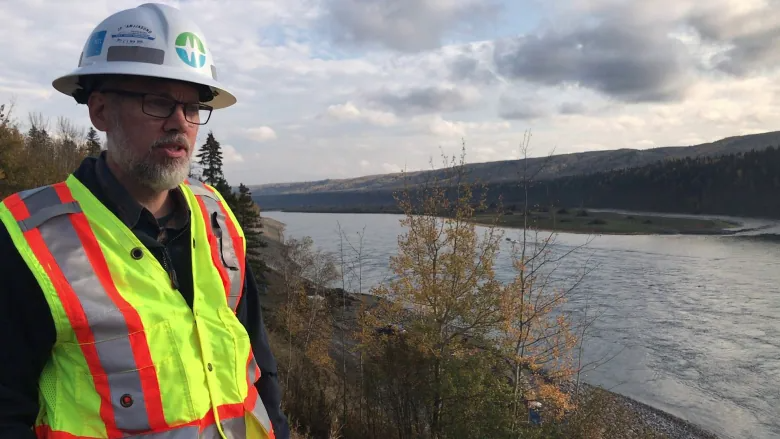Tragedy five years ago that claimed the lives of a father and his four children on the Oneida Nation of the Thames in Ontario has the community insistent that the federal government work with them to meet their water needs. On Dec. 15, the First Nation declared a state of emergency and ordered community members to start conserving water. The water alert was issued after a member reported his tap water was coming out brown, consistent with a high iron content. An investigation indicated that the level of the aquifer from the Thames River that feeds into the Oneida water tower is low. The tower services 546 homes and 22 community buildings.
Northeastern town will return to Peace River water after B.C. Hydro-funded treatment plant fails
Residents of a small town in northeastern B.C. will once again draw their tap water from the Peace River, despite an almost $5-million investment from B.C. Hydro to find an alternative source. Earlier this year, residents were under a "Do Not Consume" order for two months when the B.C. Hydro-funded water treatment plant failed. The plant was installed to process water from an underground aquifer after construction associated with the Site C dam meant the community could no longer source its water straight from the river.
2 candidates show to discuss well water issues
'It’s important to all Canadians': Petition calls on federal government to protect Tiny Township aquifer
The Government of Canada is being asked to take action to protect the Alliston aquifer, which is said to have the purest water known to science. Tiny Township resident Erik Schomann has initiated a House of Commons e-petition, with the help of Simcoe North MP Adam Chambers and former MP Bruce Stanton. This petition is urging the federal government to use the Canada Water Act and any other relevant legislation to protect the pristine waters of the Simcoe Uplands — also known as French’s Hill — so that research may proceed into how this purity is created and maintained.
Canada will never export bulk water to the U.S. — and journalists should stop writing about it
This summer, environmental groups and First Nations in Clinton, B.C., a rural village of about 650, opposed a bottling company’s application to take 500,000 litres of water a day from the local aquifer. It was far from the first time that the proposed sale of water has created controversy in Canada. But it’s usually massive schemes for bulk water exports — which aren’t allowed in Canada — rather than bottled-water businesses like the one in B.C. that grab headlines. Maclean’s published high-profiles articles on the bulk-water scare in 1999 and 2000 when an Ontario businessman applied to ship water from Lake Superior to Asia.
Under pressure, company cancels Tennessee pipeline
Environmentalists and activists claimed victory recently after a company cancelled plans to build an oil pipeline through southwest Tennessee and north Mississippi, and over an aquifer that provides drinking water to one million people. Byhalia Connection said it will no longer pursue plans to build a 79-kilometre underground artery that would have linked two major U.S. oil pipelines while running through wetlands and under poor, predominantly Black neighbourhoods in south Memphis.
The unknown impact of microplastics in drinking water
Microplastics may be contaminating our drinking water, according to a study published by researchers at the Geological Society of America. Their chemical threat stems largely from their ability to transport harmful compounds on their surfaces, meaning that when organisms at the base of the food chain ingest microplastics, they ingest toxins too. These toxins can build up and eventually result in responses like organ dysfunction, genetic mutation or even death. The researchers found bisphenol A (BPA), a chemical used to make plastics, in all 47 human samples.
Coldwater band applies to Supreme Court of Canada over Trans Mountain expansion
A B.C. First Nation is applying to argue its case at the Supreme Court of Canada for the protection of its drinking water in relation to the Trans Mountain pipeline expansion. "This application is unlike any other proceeding concerning the Trans Mountain Pipeline Expansion Project," states the Coldwater application, filed on Friday. "It is about ensuring that the sole source of drinking water within the Coldwater Indian Band's reserve is protected."
Oneida Nation of the Thames tap water different than neighbouring non-Indigenous communities
ONEIDA NATION OF THE THAMES — Jennifer George’s home sits on a gravel road that separates this Indigenous community near London, Ont., from the neighbouring township of Southwold. On George’s side of the road, virtually no one trusts the drinking water that flows from the Thames River to their homes. Many have the same 18-litre blue jugs that line the floor of George’s kitchen, ubiquitous sources of water for drinking and cooking.
Trans Mountain pipeline in limbo as Federal Court of Appeal orders Canada fix ‘flawed’ project
The Coldwater Indian Band, which asserts traditional territories in south-central B.C., said the pipeline route passes an aquifer that is the sole supply of drinking water for its main reserve “This is a major victory for my community,” said Coldwater Chief Lee Spahan. “Thankfully, the court has stepped in where Canada has failed to protect and respect our rights and our water.”












